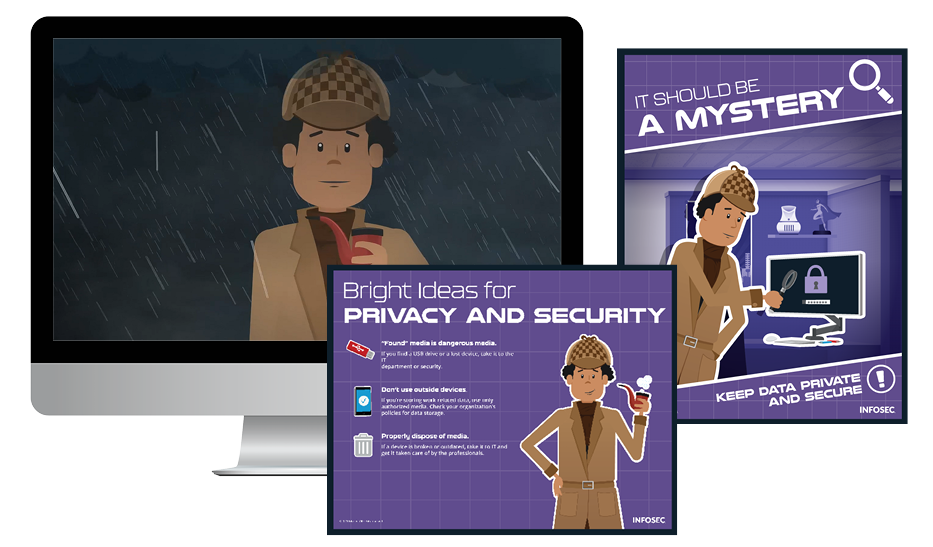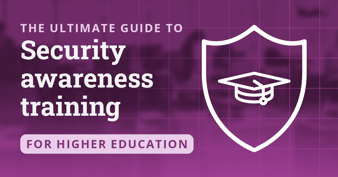Top 10 security awareness training topics for your employees in 2023 and beyond
More than 74% of breaches involve the human element, and the advancement of AI is bringing even more convincing attempts to trick employees. Sophisticated phishing attacks, automated hacking tools, AI-powered social engineering techniques and deepfake threats mean security awareness training and a culture of awareness are more critical for organizations than ever.
The good news is that organizations can shift that human risk and have their employees contribute to a cyber secure environment — with the right training. Practical and engaging security awareness training for employees can provide staff with the knowledge to identify and defend against cyber threats.

Two year's worth of NIST-aligned training
Deliver a comprehensive security awareness program using this series' 1- or 2-year program plans.
As the world of work evolves and AI technology grows, so are security threats. When designing your best security awareness training program, covering the cyber threats your organization will most likely face is essential. These are the 10 most important security awareness topics to include in security awareness training for employees.
- Email scams
- Malware
- Password security
- Removable media
- Safe internet habits
- Social networking dangers
- Physical security and environmental controls
- Clean desk policy
- Data management and privacy
- Bring-your-own-device (BYOD) policy
1. Email scams
Phishing attacks are the most common method that cybercriminals use to gain access to an organization’s network. So it’s no surprise that they lead our security awareness topics list. They take advantage of human nature to trick their target into falling for the scam by offering some incentive (free stuff, a business opportunity and so on) or creating a sense of urgency. And with AI, fraudsters can quickly refine their messaging to make the most enticing phishing email possible.
Phishing awareness should be a component of any organization’s security awareness training. This should include examples of common and relevant phishing emails, such as emails that mimic shipping notifications, tax-related phishing scams, bank alerts and internal corporate communications.
Tips for identifying and avoiding phishing emails include:
- Do not trust unsolicited emails
- Be wary of any email that creates a sense of urgency, secrecy and authority (e.g., leadership asking to send a large payment by the end of the day and to keep it secret as it’s not yet public).
- Confirm requests for sensitive data or funds via another medium (such as phone or in person) before responding.
- Be wary of unsolicited email attachments. Verify any unsolicited attachments with the alleged sender via another medium before opening them.
- Remember that these types of attacks can occur across any communication platform (including email, text messages, messaging apps, enterprise collaboration platforms and so on)
In addition, ensure your organization is filtering spam, has its email client and firewall configured correctly, and uses up-to-date antivirus.
2. Malware
Malware is malicious software that cybercriminals use to steal sensitive data (user credentials, financial information and so on) or cause damage to an organization’s systems (e.g., ransomware and wiper malware). Organizations can become infected with malware in several ways, including phishing emails, drive-by downloads (e.g., visiting a malicious site with an out-of-date browser that gets exploited), exploiting application vulnerabilities and malicious removable media.
Employee security awareness training on malware should cover common delivery methods, threats and impacts to the organization. Important tips include:
-
Be suspicious of files you download in emails, websites and other mediums
-
Don’t install unauthorized software
-
Keep antivirus running and up to date
-
Contact IT/security team immediately if you may have a malware infection
3. Password security
Passwords are the most common and easiest-to-use authentication system in existence. Most employees have dozens of online accounts accessible via a username (often their email address) and a password.
Poor password security is one of the biggest threats to modern enterprise security. And a solid password security protocol is a crucial security awareness topic. Some important password security tips to include in training content:
-
Always use a unique password for each online account
-
Follow company password practices, such as long passphrases or randomly generated characters
-
Use a password manager to generate and store strong passwords for each account
-
Use multi-factor authentication (MFA) when available to reduce the impact of a compromised password
4. Removable media
Removable media (such as USBs or external hard drives) are a useful tool for cybercriminals since they enable malware to bypass an organization’s network-based security defenses. Malware can be installed on the media and configured to execute automatically with Autorun — or have an enticing filename to trick employees into clicking. Malicious removable media can steal data, install ransomware or even destroy the computer when connected.
A popular example is dropping a USB stick in a parking lot and common areas (bonus for including an enticing label like “Employee compensation”) or handing them out at conferences and other public events. Employees should be trained to properly manage untrusted removable media:
-
Never plug untrusted removable media into a computer
-
Bring all untrusted removable media to IT/security for scanning
-
Disable autorun on all computers
In addition, some organizations may not allow employees to connect any removable media to company machines.
5. Safe internet habits
For most organizations, nearly every employee has access to the internet — and more teams becoming remote has led to a surge in online collaboration. For this reason, building secure online habits across employees is paramount for companies.
Security awareness training for employees should incorporate safe internet habits that prevent attackers from penetrating your corporate network. Some important content to include in training:
-
The ability to recognize suspicious and spoofed domains (like yahooo.com instead of yahoo.com)
-
The differences between HTTP and HTTPS and how to identify an insecure connection
-
The dangers of downloading untrusted or suspicious software off the internet
-
The risks of entering credentials or login information into untrusted or risky websites (including spoofed and phishing pages)
-
Watering hole attacks, drive-by downloads and other threats of browsing suspicious sites

Get six free posters
Reinforce cybersecurity best practices with six eye-catching posters found in our free poster kit from our award-winning series, Work Bytes.
6. Social networking dangers
Social networking is a powerful tool for enterprises to build brand awareness and generate sales, and each of your employees likely belongs to multiple social networking sites. Unfortunately, cybercriminals use social media in various ways to potentially damage your organization or gain unauthorized access — from harvesting data for a future social engineering campaign to phishing attacks that steal credentials to sharing malicious links that could lead to incidents like ransomware.
To prevent the loss of critical data, your enterprise must have a viable social networking training program that should limit the use of social networking and inform employees of the threats of social media:
-
Phishing attacks can occur on social media as well as over email
-
Cybercriminals impersonating trusted brands can steal data or push malware
-
Social engineers are exceedingly good at taking small pieces of information published on social media to craft convincing spearphishing emails
7. Physical security and environmental controls
Security awareness isn’t just about what resides in your company’s computers or handheld devices. Employees should be aware of potential security risks in the physical aspects of the workplace.
Examples of physical security topics include:
-
Visitors or new hires watching as employees type in passwords (known as “shoulder surfing”)
-
Letting in visitors claiming to be inspectors, exterminators or other uncommon guests who might be looking to get into the system (called “impersonation”)
-
Allowing someone to follow you through a door into a restricted area (called “tailgating”)
-
Leaving passwords on pieces of paper on one’s desk
-
Leaving one’s computer on and not password-protected when leaving work for the night
-
Leaving an office-issued phone or device out in plain sight
-
Physical security controls (doors, locks and so on) malfunctioning
8. Clean desk policy
A clean desk policy is a sometimes-overlooked security awareness topic that ties back to physical security. Sensitive information on a desk, such as sticky notes, papers and printouts, can easily be taken by thieving hands and seen by prying eyes.
A clean desk policy should state that information visible on a desk should be limited to what is currently necessary. Before leaving the workspace for any reason, employees should securely store all sensitive and confidential information.
9. Data management and privacy
Most organizations collect, store and process a great deal of sensitive information. This includes customer data, employee records, business strategies and other data important to the proper operation of the business. Suppose this data is publicly exposed or accessible to a competitor or cybercriminal. In that case, your organization may face significant regulatory penalties, damage to consumer relationships and a loss of competitive advantage.
Employees within an organization need to be trained on how to properly manage the businesses’ sensitive data to protect data security and customer privacy. Important training content includes:
-
The business’s data classification strategy and how to identify and protect data at each level
-
Regulatory requirements that could impact an employee’s day-to-day operations
-
Approved storage locations for sensitive data on the enterprise network
-
The use of a strong password and MFA for accounts with access to sensitive data
10. Bring-your-own-device (BYOD) policy
BYOD policies enable employees to use their personal devices in the workplace. While this can improve efficiency by enabling employees to use the devices that they are most comfortable with, it also creates potential security risks.
Security awareness training for employees should include the following:
-
Secure workplace devices with a strong password to protect against theft
-
Use a VPN on devices when working from untrusted Wi-Fi
-
Follow company policies around additional protection, such as a company-approved antivirus
-
Only download applications from major app stores or directly from the manufacturer’s website
In addition, the organization may require that full-disk encryption is enabled for BYOD devices and use tools to restrict what can be accessed or shared on the company portion of the device.
Phishing simulations & training
Keep yourself safe with these security awareness tips
Security awareness training for employees plays a crucial role in running a modern business. An untrained and uninformed workforce can put your enterprise in danger of data breaches or other cyber threats. Organizations should adopt a viable security training program encompassing top security awareness topics to help build an educated and cyber-aware workforce.
That may include an ongoing security awareness program with a layered approach to education, frequent security reminders, training all new personnel on new policies as they arrive and implementing creative incentives to reward employees for being proactive in building a security culture.








